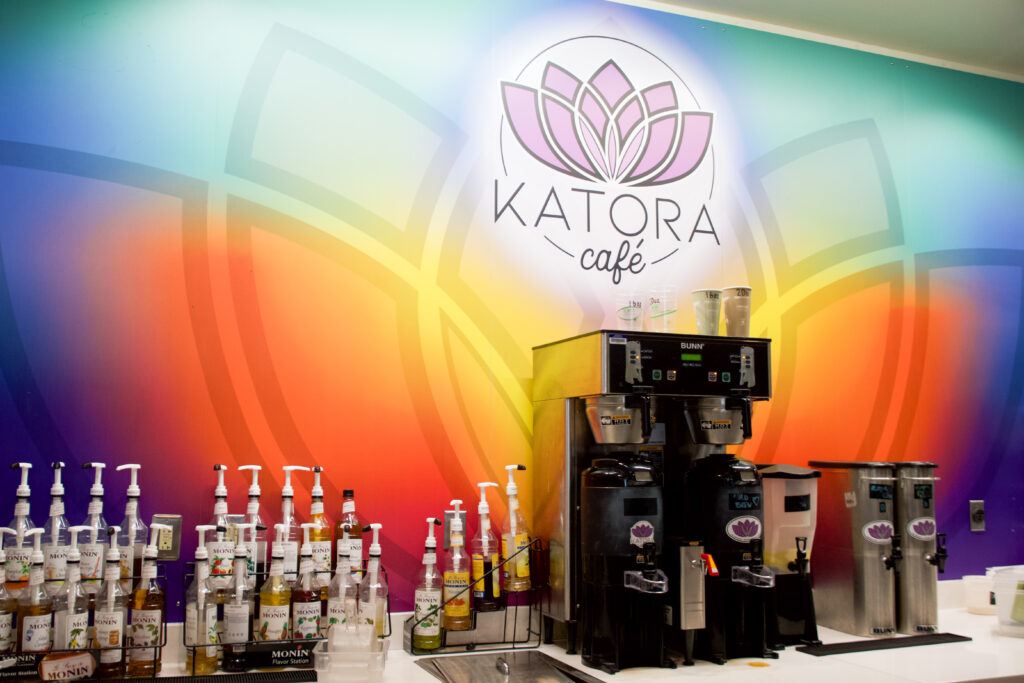Katora employees quit due to inconsistent pay following delayed paychecks, co-owners seek community assistance
4 min read
Katora employees left their positions after the co-owners delayed their paychecks to an unknown date. | Abbey Magnet, The Weekly Ringer
by CLAIRE MARSHALL WATKINS
Staff Writer
On March 25, April and Christian Zammas, co-founders and co-owners of Katora, sent a message to UMW Katora employees informing them their paychecks would be delayed until an unknown date. “If you’re in a pinch, don’t hesitate to reach out. We’re hoping this is a one-off thing,” they wrote at the end of the message.
According to Christian, he and April are responsible for $450,000 worth of debt from a loan taken during the pandemic that was used for infrastructure improvements at the two locations. Christian shared that both shops operate as one business and their finances are intertwined because the Mary Washington location receives no revenue during semester breaks—about four and a half months out of the year.
“[E]ach semester we hope to have a cache of funds to purchase goods and support the first payroll while we wait for the first payment,” said Christian about the Katora at UMW. “Instead we had to dip into funds that were set aside for other payments. This began the domino effect that we see culminating today.”
In the past few weeks, two employees at the on-campus location have quit due to Katora’s financial situation. On April 7, the UMW Katora location posted on their Instagram story that they are hiring in which they asked anyone who has applied in the past to direct message them to let them know they are available to work.
Enya Cea-Lavin, a sophomore English and education double major, worked at Katora for nearly two years but cited Katora’s money and debt issues as her reason for quitting on April 3.
“I asked if we were going to see our paycheck coming in, and we did not get a response, and that was kind of my last straw for the situation,” said Cea-Lavin. “So I sent out a message saying that I can’t keep working at a place that isn’t going to be paying me when I need to be paid [and] is going to use my labor without [me] getting benefits from it.”
A current employee, who wished to remain anonymous, said, “It just seems like we’re not being paid consistently … There was like a span of two weeks where we just weren’t getting paid and now it seems like we are.”
“Usually, we get paid on Tuesday. So when I say it seems like we are, we checked on Tuesday [April 2] if we got paid and some people did, some people didn’t,” said the anonymous employee, explaining the patchwork pay cycle.
As far as their financial woes have affected employees, Christian said, “We have always fulfilled our payment obligations. While there have been instances of delayed payments in the past, we are committed to ensuring that this does not occur again.”
On April 4, April responded to an Instagram message from a Weekly Ringer reporter that she was “happy to report they are all paid up!” regarding employee payments.
But unreliable pay is not a new trend for Katora. In 2019, Katora replaced the previous on-campus coffee shop, Blackstone. According to an article published by The Weekly Ringer, after almost five years in business, Blackstone’s closure “prompted strong reactions from students, including former Blackstone and Katora employees.” In the article, Katora employees at the downtown location expressed concerns and frustrations about the new location opening, and they mentioned that their pay was frequently delayed as well.
The article quotes a former anonymous Katora employee who said, “We would sometimes go weeks without pay, and if we asked about it, we were given cash advances in odd amounts.”
Continuing in the article, Justin Adams ‘20, a former employee at Katora from December 2017 to August 2018, mentions that even amidst Katora’s financial struggles, there was always new decor in the store.
On March 22, April launched a GoFundMe titled, “Help Save Katora, the little shop doing big things” with a fundraising goal of $87,800. According to the description on the GoFundMe site, this money would go towards expanding and adding new programs within Katora, particularly a training program for the hospitality industry, paying off debt to the state, city and other acquired debts and shop repairs.
“We’ve tapped into our circle of friends, hit up banks, and leaned on family for loans. We’ve used retirement savings, our full-time income and tax refunds to keep the shop afloat,” April wrote in the description.
She continued, “While managing our own bookkeeping with a local CPA’s guidance, we’ve recognized the need to switch to full-service bookkeeping for tax compliance. This change will streamline operations, like our efficient payroll system, and is crucial for our growth.”
Currently with 39 donations, the GoFundMe has reached $2,185. In an email interview, Christian described this fundraiser as an investment opportunity for the community.
According to April’s message on the GoFundMe, if the issues are not settled within a year, “then we can graciously sail into the sunset, knowing we did all we could and even asked the community we love to help bail us out,” she wrote.
“Katora is a creation from love from me and my wife to provide a safe space for us to exist in, for others to have access to equitable opportunities which in turn facilitates authentic community engagement,” said Christian in an email interview. “We’re committed to addressing challenges and maintaining transparency, admitting our mistakes and forgiving mistakes made against us.”










